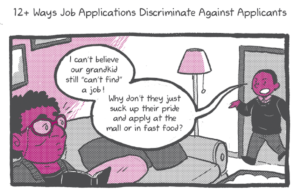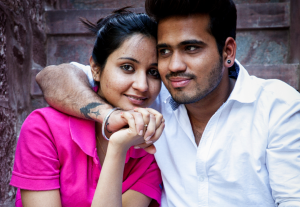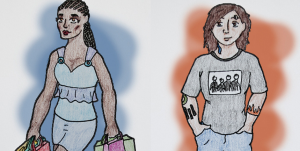(Content Warning: Rape, sexual trauma, detailed descriptions of sex)
It was a few years after college, and I was about to sleep with a girl I’d met online.
It wasn’t the first time we’d had sex, and though I had not yet begun to seek help for the multiple sexual assaults and rapes I’d experienced years before I met her, things had been going fine.
Until, all of a sudden, they weren’t.
This specific night, I consented to having sex with her, and consented to being penetrated, but then, out of nowhere, I began having a manic attack.
I needed her to not be inside me for an excruciating several minutes before I thought it was an okay time to stop the festivities by claiming I had to pee.
My heart was racing, and I was suddenly unable to concentrate on anything except running away to be in a quiet place. I felt like my thoughts were chasing me and the only way to escape was to be totally alone, somewhere I could close a door.
It wasn’t the first time I’d gotten really upset while someone was fucking me – but it was the first time it triggered a manic episode.
I booked it to the bathroom and sat on the edge of the tub shaking for a little while, wondering what the hell was going on with me.
It’d be another three years before I got the diagnosis of bipolar disorder, and another two after that before I realized that it was manic episodes I was experiencing after someone fucked me in a certain way.
But now that I know that, for whatever reason, my brain likes to do this, I’m a little better at communicating with my partners and taking care of myself.
My manic episodes are usually indistinguishable from a mild sugar high, or the way someone might act if they got really good news. That’s one of the reasons it took me so long to be diagnosed. Usually, they don’t affect my life very much.
But sometimes the racing thoughts and the frenetic energy and the weird rotating cast of physical symptoms (my ribs tightening, my limbs numbing) can be very disruptive – especially when I’m trying to get my groove on.
Sex after rape is often complicated, but it can be especially difficult to navigate when you don’t respond in the way your partner expects.
What is most likely, when my trauma is triggered, is that I’ll spring up from the bed and start chain smoking and cracking jokes. It’s how my trauma manifests. It’s weird, it’s mine, it’s okay. But although I accept the way my body and mind react to stressful situations, it can be difficult to explain.
Think about the way survivors are portrayed in the media – if they’re “lucky” enough to be depicted as having sexual agency at all, being triggered usually manifests as them curling up and crying. And men are rarely represented.
People who haven’t experienced sexual violence often don’t have a script for what actually happens when a survivor is triggered (note: this can also be true of people who have experienced sexual violence – everyone is different, so it’s always possible that a partner will have a reaction you don’t expect).
In addition, it’s very difficult to understand on an intuitive level that laughing and being energetic, which are two behaviors that occur during mania for me, are connected to trauma and not “happy” behaviors.
Sexual assault can change the way a person experiences sex, and, especially when you have multiple marginalized identities that can already make sex challenging (like mental illness), it’s important to be safe, know yourself, and have an arsenal for taking care of yourself.
If I could ensure that every sexual partner of someone who’d been raped was understanding, educated, and patient, I would, but we can’t control how our partners react.
We can, however, control how we care for ourselves, and practice being our own advocates and healers.
In the meantime, while we work towards society where every sexual partner has a wonderfully kind response to disclosures of trauma, you are your own best advocate, and your own best caretaker.
Here are some tips on having sex after sexual assault when you don’t know exactly how you are going to react:
1. Work On Your Sexual Wellness – Continuously
If you want to be sexually active (and it’s completely okay if you don’t!) you should be stretching your sexual muscles – and I don’t mean perfecting your sexy face in the mirror.
Preparation for sexual activity doesn’t just mean bringing a condom.
I like casual sex! I like being able to go home with someone I don’t know very well and have a romp. But the only way I can safely and responsibly do so is by making sure that I’m, generally, in a place where I will be able to take care of myself and effectively communicate with my partner.
I needed to reevaluate what I would and would not do, with whom, and when.
I had some conversations with my friends, and did a lot of reflecting, and came up with a set of flexible guidelines for sexual encounters that I generally stick to.
It makes me feel safe to have a mental list of activities I know I almost always like, and a list of activities I may want in the moment, but which I have to be careful about engaging in.
Many of the times I’ve been triggered, it’s been because I decided to engage in a (for me) mentally risky activity without adequately preparing myself or my partner for potential fallout.
Sometimes things would go totally smoothly, and sometimes they would go totally south. I needed to do something to have more control over whether I was going to have a sudden mental health crisis instead of an orgasm.
You can role-play scenarios or plan out your dates to a T – or you can be more casual in your preparation, but doing some sort of mental/emotional work on yourself before you find yourself in a sexual situation is key.
There are a variety of ways to practice developing a healthy sexuality – traditional therapy, affirmations, “tapping,” mindfulness exercises, and meditation are all good ways to keep in touch with yourself and explore what you’re feeling and what you need.
2. Check In With Your Body
I have been raped five times, one of them so recently the bruises still haven’t healed. My self-care toolkit at this point is pretty well-stocked (there’s a lot of good suggestions on this list, for example), but I’m always learning new ways to take care of myself.
Taking good care of your body is important for everyone, but it can be especially crucial for people like me who have had our bodies hurt or violated.
Sometimes I feel disgusted by my body because of the trauma it’s endured. Sometimes I feel powerless.
Whatever negative emotion I’m feeling, though, isn’t going to disappear if I treat my body like crap. Taking care of myself after assaults or after being triggered can be hard, but I can’t feel better unless my body feels healthy.
For example, after my most recent assault, masturbation was very helpful. I don’t usually like to use the word empowering, but that’s what it felt like.
I remember thinking, “Nobody gets to touch my body but me!” and feeling wonderfully in control. I felt good because every single aspect of the encounter was under my control.
It was very healing to be intentional about what I was touching, when, where, for how long – things that you can certainly communicate to a partner during sex, but when you’re masturbating can be instantaneous decisions.
3. Let Your Partner Know What to Expect and What You Need in Advance
Let your partner know that you may be triggered by something during sex, and, if you can, what kind of things usually trigger you. Yes, even if it’s a one-night stand.
Having a quick “Hey, I might need to stop if we do this thing” conversation is likely to help prevent confusion and negative emotional reactions should you have an adverse reaction to something that happens during sex.
If it’s a longer-term sexual relationship, communication is even more important. Here’s a guide to loving someone who’s experienced sexual assault.
Important Note: You are never required to disclose anything about yourself that you do not want to disclose. If you feel uncomfortable with the idea of telling a sexual partner that you’ve been assaulted, practice ways of asking for what you need without explaining why you need them.
For example: I like to say, before I sleep with someone, “Please don’t touch my nipples, I don’t like the way that feels.” Often, it’s as simple as that!
You can also give your partner or partners a heads-up if you’re trying something that may upset or trigger you, such as “Hey, I’d love to try [this thing], but I’m not totally sure how I’ll feel about it. Could we check in please?”
4. Pay Attention to Yourself
I usually can tell if I’m about to get upset. Sometimes I try to “push through it,” and that’s my prerogative and yours, too!
But it might be good to take a break sometimes and to alert your partner(s) that things may or may not get confusing.
It’s okay to push through discomfort in pursuit of pleasure, and it’s okay to stop at the first signs of distress.
As long as you are in tune with what you need and are communicating well with the other person involved in the sexual encounter.
5. Have a Self-Care Plan That You Can Implement
What calms me down is a cigarette and calming music, so I make sure I have a pack and a playlist on my iPhone
This writer suggests taking a bath.
RAINN has some good suggestions as well.
You know what works best for you – make sure you have a way of taking care of yourself in the event that something goes wrong.
6. Practice Advocating for Yourself in Situations Like This
I recently had a very good experience with a very new partner who was a stranger to me when I told her I needed to be alone for a few minutes because I had a manic episode triggered by rape. She was wonderful, but not everyone is as great.
Keeping a script in your back pocket can help with confidence. Having something simple, firm, and polite that you can practice saying in the mirror or to a trusted friend can help you so much with confidence in a sexual encounter – even if you don’t end up needing it!
***
People react in all different kinds of ways to trauma, especially if it co-occurs with mental illness.
Navigating sexual and romantic encounters when you can’t always predict how you’ll feel can be tricky, but whatever your reaction, know that you have every right to enjoy any sexual encounters you choose to engage in.
Taking care of yourself is an act of radical self-love, and you deserve it!
[do_widget id=’text-101′]
Logan Howlett was raised in the middle of The Great Swamp and spent her formative years reading everything she could get her hands on, sneaking over to other kids’ houses to watch TV, and memorizing the words to every Dido song. While at college, she worked as a Digital Music Monitor, shaggy dog walker, and as a community educator on transgender rights. Now she pays bills professionally and makes coffee on her own schedule.
Search our 3000+ articles!
Read our articles about:
Our online racial justice training
Used by hundreds of universities, non-profits, and businesses.
Click to learn more





















